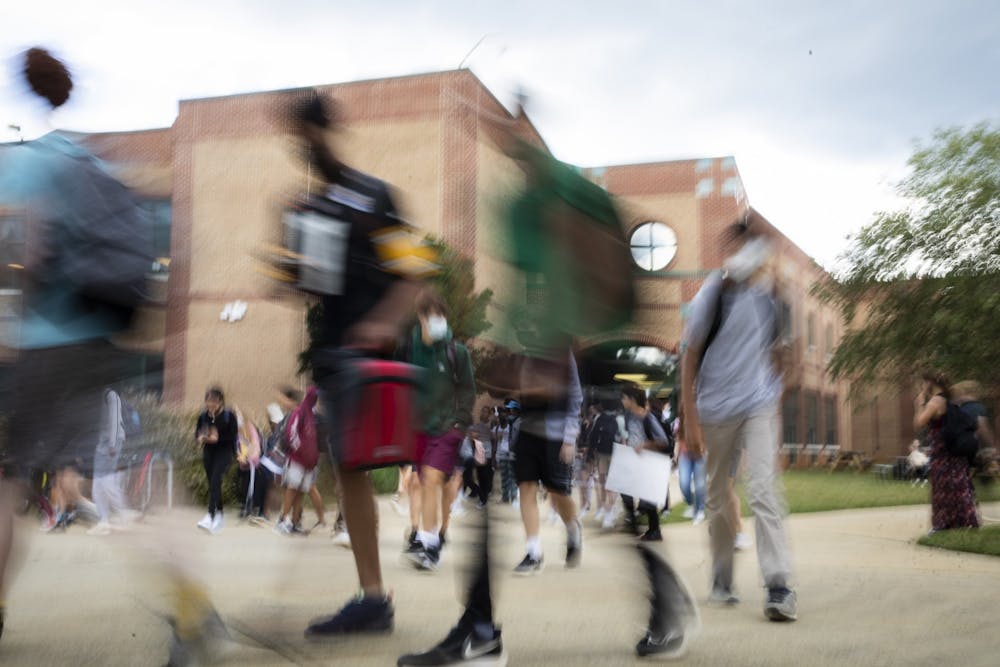The county purchased the portable scanners, which can be used at entrances to events — such as football games and graduation — or brought to schools if there is a verified threat.
At schools across the state, other measures are being taken to “harden” schools, such as implementing keypad-controlled entrances for students and faculty, Campbell said.
Mike Richey, the executive director of emergency management, safety and security at GCS, said identification cards are required to check into schools in the district.
Richey said ID check-ins are not only useful in the event of an emergency, but also help to foster connections between the students and adults in the school.
“One of the biggest issues with keeping our kids safe is that relationship between the trusted adult and the children,” he said. “It’s having that person that the child can reach out and feel comfortable with, whether they’re reporting something or because they’re worried about someone else or they’re worried about themselves, having that ability is the most important piece.”
Orange County Schools will be applying for safety grants to increase security measures in their schools, Deputy Superintendent Patrick Abele said in an OCS Board of Education meeting on Aug. 8.
Currently, OCS has several school security strategies in place that include additional door entry access control systems, annual training on Active Shooter response for staff and bleed-control kits in all OCS classrooms.
Shannon Klug, a volunteer with the N.C. chapter of Moms Demand Action, has children who are CMS students and alumni. She said she believes school systems should focus on providing social services for students.
“I think that as a parent and actually as an activist too, I’d say that we need to go for the root cause of our gun violence problem in this nation, not have like a Band-Aid, which is the way I kind of see these metal detectors,” she said.
Campbell emphasized it is important for districts to also implement restorative safety measures.
WSFCS is doing so with its new Code of Character, Conduct, and Support, which aims to take a preventative and restorative look at discipline.
“There’s a lot of research that shows if we can get to the root cause of why someone may be acting out or why a student may be facing a problem or challenge in school, you can also prevent that behavior, but you can also teach that behavior and teach the correct behavior,” Campbell said.
To get the day's news and headlines in your inbox each morning, sign up for our email newsletters.
Some North Carolina schools have begun implementing programs such as the Social and Emotional Learning curriculum from the North Carolina Department of Public Instruction, which Klug believes builds community among students and teachers in her children’s classrooms.
Other programs, including the Say Something Anonymous Reporting System and Crisis Go apps, help students anonymously report threats and quickly connect them to their school’s administrative and security teams.
Counties across the state are also redefining the role of student resource officers in middle and high schools.
According to the North Carolina Department of Public Instruction Annual Expenditure Report, Orange County Schools spent $89,967 on SROs in 2020-21. Orange County is ranked 55 out of the 84 counties in North Carolina reporting data for the greatest percentage of total expenditures spent on SROs.
Donovan E.C. Bethea, a student at N.C. A&T and member of the NC Task Force for Safer Schools, said the task force offered perspectives and ideas on how to train SROs, as well as how they can better connect with students.
Bethea, who has been an advocate for himself and his peers in the Wake County Public School System, said he thinks having teachers who represent students from various backgrounds creates comfort and safety.
Klug said by providing more mental and behavioral health services, NC school systems will better support students.
“I would love to see more funding go in that direction, towards social and emotional health for the students, because ultimately, that’s really what’s going to make the biggest difference,” Klug said. “We’re going to grow students that are going to be better adults and more emotionally intelligent and aware of themselves and others.”
Although counties across the state are taking varying approaches to school safety, many are monitoring what other districts are doing to increase safety for students. Campbell said WSFCS is constantly seeking the best safety measures possible.
@eliza_benbow
@DTHCityState | city@dailytarheel.com
Eliza BenbowEliza Benbow is the 2023-24 lifestyle editor at The Daily Tar Heel. She has previously served as summer university editor. Eliza is a junior pursuing a double major in journalism and media and creative writing, with a minor in Hispanic studies.



